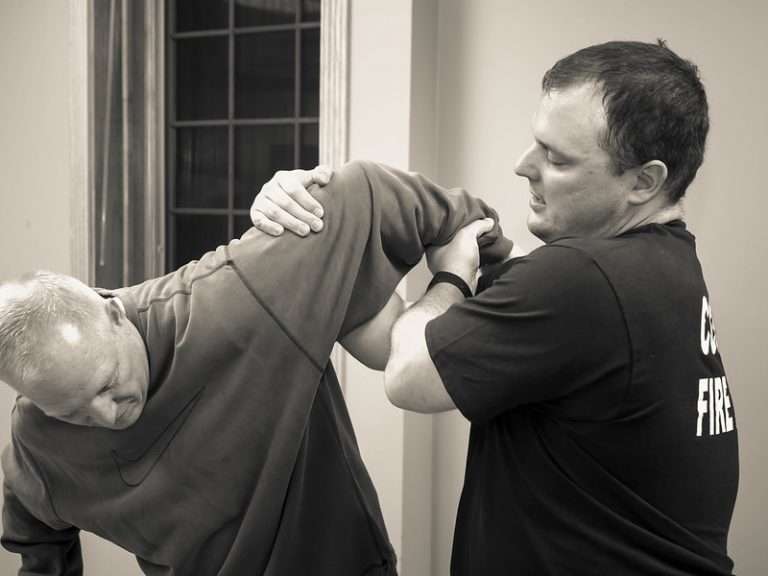
So you bought a gun for protection, and you know how to shoot well. But did you know that self-defense takes more than aiming and pulling the trigger? If the offender swiped the gun out of your hands, now what? We’ll get into details on how to defend yourself and more in this Ultimate Guide To Self Defense.
Self Defense Basics
Aside from improving your shooting skills, learning self-defense is also important. Knowledge and training in martial arts come with plenty of advantages. It serves as a backup weapon in case you get disarmed by your attacker and you need to confront him (or her) by fist. It’s also a form of exercise to keep you in shape
What are 3 types of self-defense?
There are three types of self-defense – armed, unarmed, and verbal self-defense.
Armed Self Defense

This type of self-defense involves the use of weapons such as pepper sprays, stun guns, emergency whistles, tactical pens, knives, or guns. Of course, to defend yourself properly using these weapons, you must know how to use them by heart. We’ll get into details about self-defense weapons in a bit, so keep reading.
Verbal Self Defense

Yes, verbal self-defense is a thing. It’s important to know how to defend yourself from foul-mouthed people especially if they’re out of line or if it’s taking a toll on your health. But keep in mind that it can be used in verbal arguments only. Because you obviously can’t reason with criminals who have no intention of listening to what you’re about to say.
Unarmed Self Defense
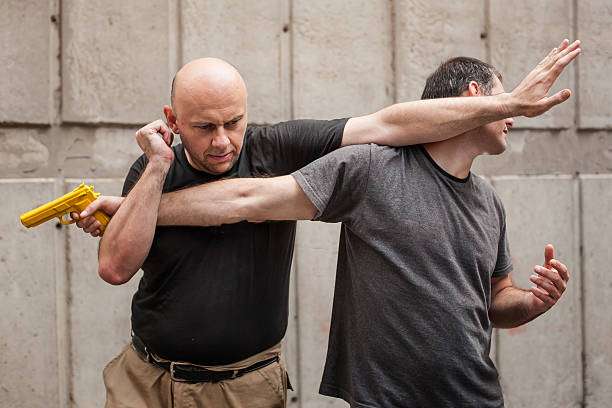
Unarmed self-defense is where you apply your martial arts training. If you haven’t yet, you can take up lessons on any of the martial arts forms below:
- Taekwondo – Aside from teaching you how to kick, punch, and block, Taekwondo also teaches discipline and self-control.
- Karate – Like Taekwondo, Karate also teaches discipline. But it involves more hand attacks and fewer kicks.
- Kickboxing – It trains you in distancing, defense, feinting, timing, power, endurance, and sparring. It also teaches you how to deliver damaging blows without your attacker predicting your moves.
- Brazilian Jiu-Jitsu – This diverse sport is one of the best forms of self-defense martial arts as it teaches you proper breathing techniques aside from efficient grappling skills.
- Muay Thai – It mostly trains you to use your body as a weapon and as a form of defense, making it a very effective survival sport.
- Krav Maga – It enhances your natural instinct to respond to danger so you can react efficiently in any scenario. FBI and SWAT agents also use it during battle.
- Boxing – It teaches you to throw basic punches such as the jab, the hook, the cross, and the uppercut. It also teaches you the proper stance and footwork needed to defend yourself.
If you don’t have time to take up martial arts lessons, learn at least one or two moves that can incapacitate your attacker or learn how to disarm your attacker’s weapon.
What are the 3 elements of self-defense?
The three most important elements of self-defense are Awareness, Assessment, and Action. These three factors will help you defend yourself and get away from your attacker.
Awareness
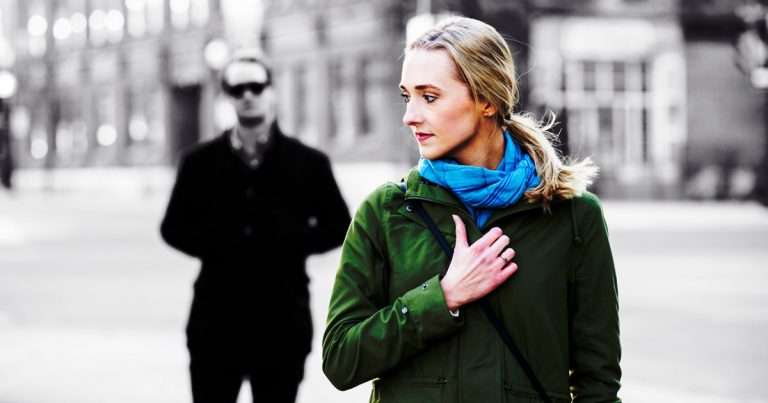
The first element of self-defense is awareness. You should be alert at all times, whether you’re in a place full of crowded people or in a dark alley. Make a habit of paying attention and being on the lookout for anything out of the ordinary. You should avoid confrontation as much as possible, so as soon as you notice someone shady or if the situation seems fishy, follow your gut and scram. Finally, leaving unnoticed will only be successful if you scanned the area beforehand for the nearest exit.
Assessment

A quick assessment of the situation will help you get away and avoid confrontation. It gives you the advantage of avoiding a dangerous situation before it occurs. Aside from the environment and the hostiles, you also need to assess yourself, like if you’re in good shape to fight off your attacker. If you’re at home, this is an advantage for you, because you’ll know where to hide or where the nearest exits are.
Not everyone can respond to threats quickly, or you could end up getting stuck in the area. If any of these happen and you don’t have a weapon with you, look for the nearest thing you can grab and use it as a weapon.
Action
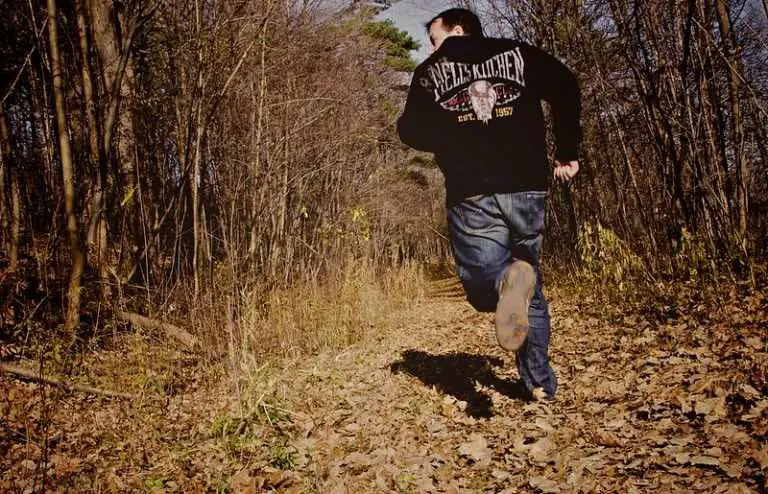
Once you’ve assessed the situation, act calmly but quickly. If there’s no possible escape route, then you have to keep a low profile. Don’t do anything that will make the attackers notice you. If worse comes to worst, you’d have to defend yourself and fight them.
If you have martial arts training, that would be a great advantage because your potential attacker won’t see it coming. But remember, your martial arts skills are nothing if you can’t remain calm. If you feel like this would be a problem for you, you need to train for this too. Some forms of martial arts like Brazilian Jiu-Jitsu teach proper breathing techniques to help keep you calm in threatening situations.
Here are four things you need to remember when facing an attacker:
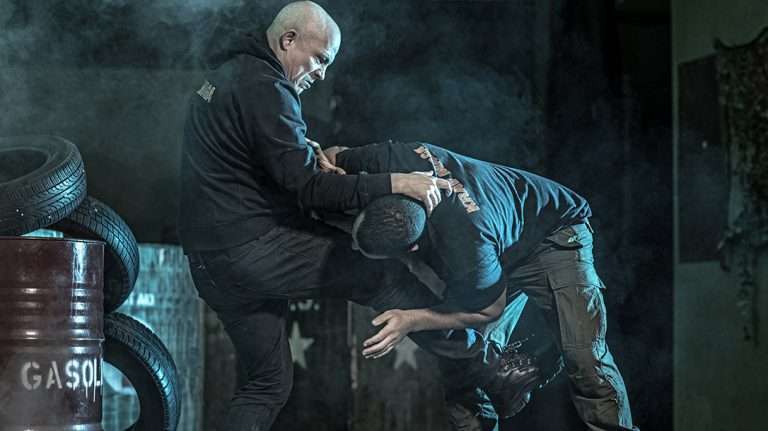
- Intimidation – Put on your game face and get your weapon ready. This will show your attacker that you’re not scared and that you can put up a fight. Never show any signs of weakness. Who knows? If you intimidate your attacker/s enough, they might leave you alone.
- Distance – Aside from the one in his or her hand, your attacker may have a weapon hidden somewhere with them so it’s best to keep your distance. That’s why your choice of weapon is critical. It shouldn’t require any close contact if possible.
- Damage – If you’ve got a non-lethal weapon, make sure it can inflict serious damage on your attackers. If you have a gun, get enough practice to make sure you can incapacitate them quickly.
- Convenience – Your weapon must be accessible (for you, not for your assailant). This way you can easily draw it if the situation escalates.
Self Defense Tools and Weapons
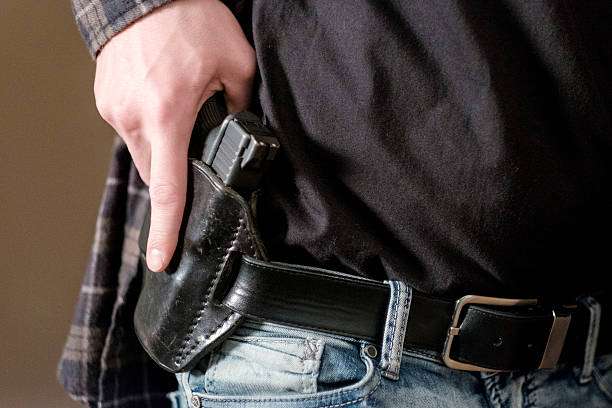
We’ve mentioned earlier that aside from your martial arts skills, you can add weapons in your EDC to help you from unexpected attackers. Let’s start with non-lethal weapons.
Non-lethal Weapons
If you’re not into guns.. WHY??
Just kidding, that’s fine, we don’t take it personally. We get it, you have nothing against guns, it’s just that you’re not drawn to them – to each his own, right? Or, maybe your state or country doesn’t allow them.
But you still need to defend yourself, don’t you? These non-lethal weapons will come in handy in defending yourself without causing harm.
Pepper Spray
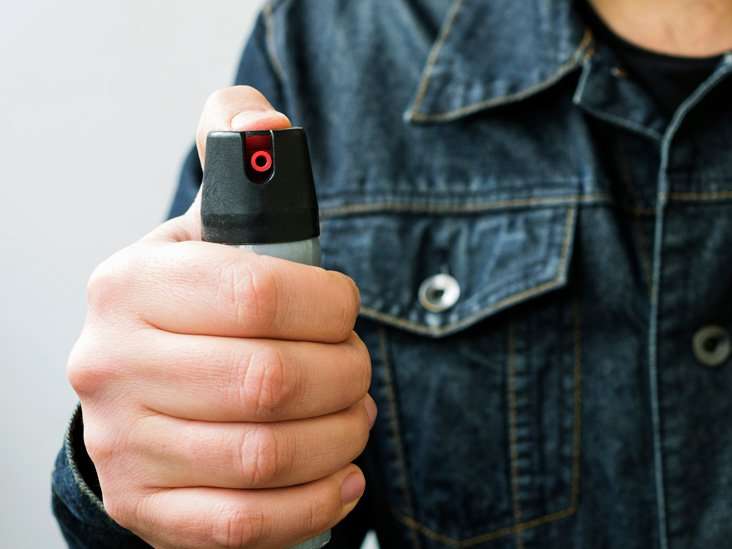
Pepper sprays are used by civilians and law enforcement officers worldwide. They can incapacitate and blind your attackers temporarily. Once you’ve sprayed it on your attacker’s eyes, run as fast as you can and look for the nearest police station. Also, make sure that your pepper spray bottle is never empty and always check if it hasn’t expired yet.
Check out best deals in Amazon
Stun Gun
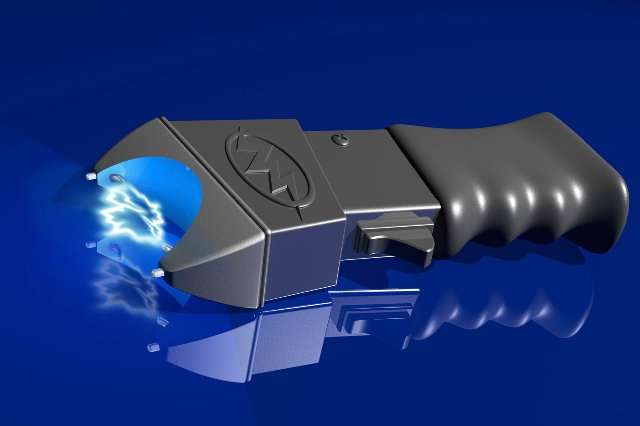
Stun guns are widely used self-defense weapons because they’re easy to operate and are compact. They also deliver instant damage to your attacker. One disadvantage of a stun gun, however, is that you need to make close contact with your attacker to be able to use it.
Check out best deals in Amazon
Tactical Flashlight
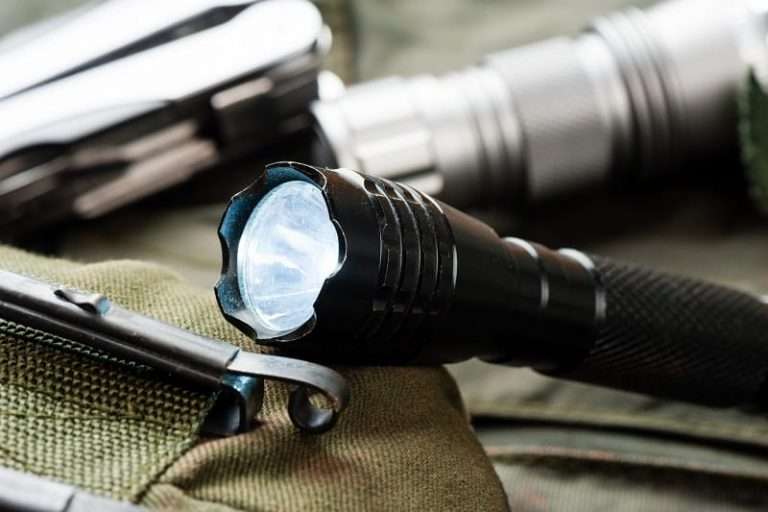
Tactical flashlights aren’t just helpful sources of light in cases of emergency, but they’re also great self-defense weapons, especially the brightest and sturdiest ones. Get a flashlight that’s made from aircraft-grade aluminum for guaranteed durability. Some survival flashlights like the Surefire E2D Defender feature a strike bezel, making them great self-defense weapons.
Check out best deals in Amazon
Baseball Bat
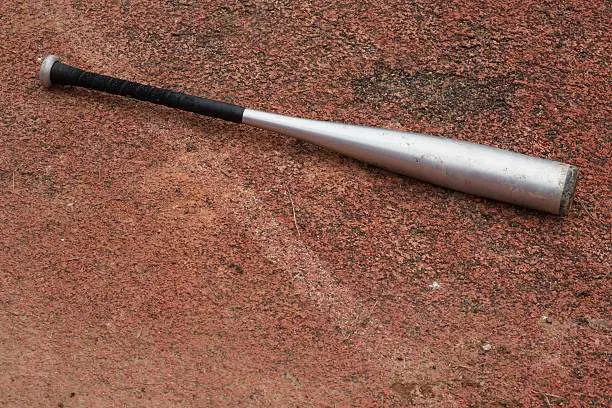
Baseball bats aren’t just great for playing baseball, they’re also very useful as home defense weapons. Get a bat that’s unbreakable or is sturdy enough to hit someone big and burly. It’s also important to buy a baseball bat that’s appropriate for your size and height. It shouldn’t be too long or too short for you. So you can quickly change its direction and swing it easily.
Check out best deals in Amazon
Concealed Carry Guns
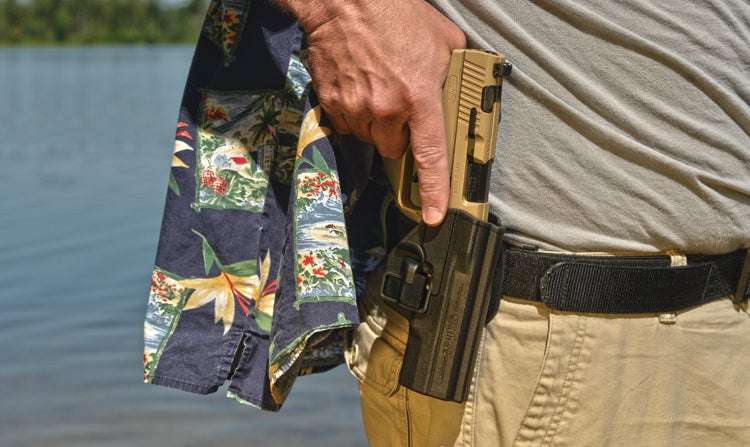
Another widely used self-defense weapon is a concealed carry gun. Not only is it convenient but it’s also very effective in disabling your attacker without you having to get close. It also gives you the element of surprise. For your CCW to be successful, you’d need a reliable holster or purse that won’t print out what you’re carrying. You can check out our list of concealed carry essentials below.
If you haven’t decided which caliber to buy yet, here are the most popular ones for civilians and law enforcement personnel alike:
- .357 Magnum.380 ACP
- .38 Special
- 9mm
- .40 S&W
- .45 ACP
- 10mm
Home Defense Weapons
Statistics show that over 1.9 million burglaries occur in the US every year. If you didn’t know this before, now’s the time to think about getting a home defense weapon.
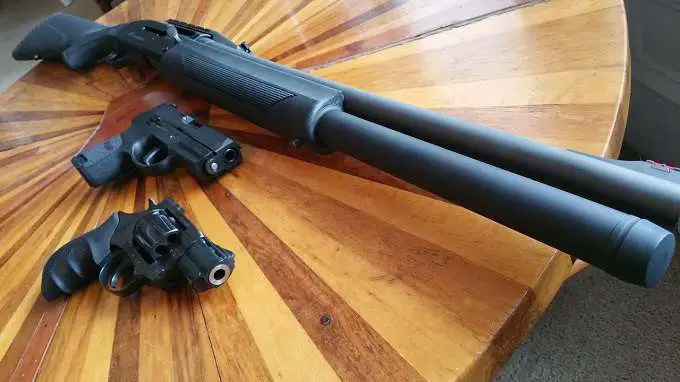
For home defense weapons, we suggest you stick to shotguns and handguns. They’re the most effective weapons to protect yourself and your household from intruders. That’s because rifles are too powerful for home invasion scenarios where it’s harder to control what’s behind your attacker.
Of course, aside from acquiring shooting skills, you should also prepare a contingency plan for when someone breaks into your home. First, keep your gun somewhere accessible to you or any of your family members. You should also designate a place where the most vulnerable members of your household can hide. Also, assign someone who can call for help as soon as possible.
Combat Knives
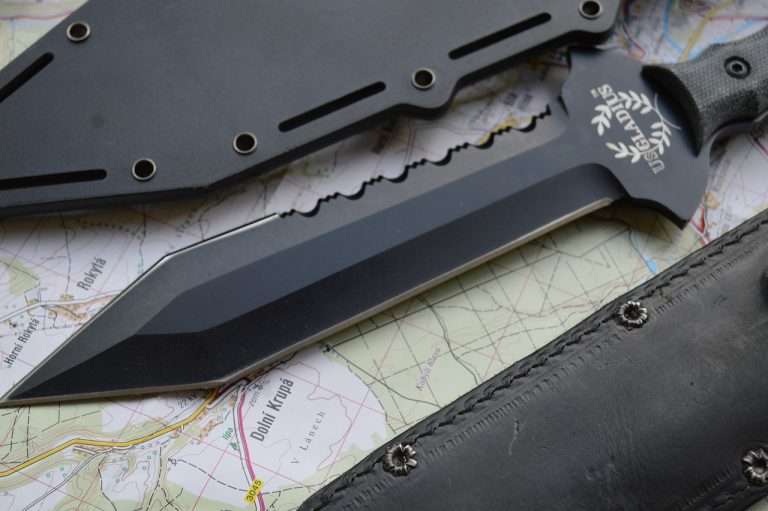
Combat knives are the most functional type of knives. They’re easily concealable and don’t take up too much space. One disadvantage of knives is that they’re only useful when your assailant is in close proximity (unless you can throw it from afar like a ninja). Other than this downside, knives are great self-defense weapons that you can also use as tools at home or during camping and hiking trips. Finally, the best combat knife can survive daily wear and tear for a long time. If you want to gain basic blade knowledge, check out our guide to knife blade types.
Concealed Carry
If you’ve decided to do concealed carry. Here are the accessories you’d need aside from a reliable gun.
Concealed Carry Holsters
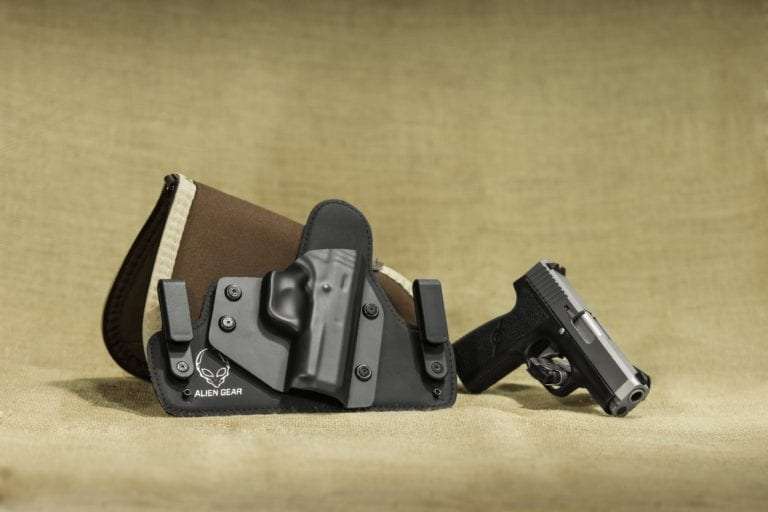
Choosing a concealed carry holster and deciding on the types of gun holsters are critical as it will help you keep your gun hidden, deploy it quickly when needed, and wear it comfortably every day. When choosing one, make sure it’s the perfect fit for your body size and your gun (naturally). Also, consider accessibility and ease of drawing. In the end, you want a holster that satisfies the complete list of concealed carry holster must-haves. Below are the types of holsters you can choose from.
- Best Belly Band Holster
- Inside-the-Waistband Holsters
- Outside-the-waistband
- Paddle holsters
- Shoulder Holsters
- Ankle Holsters
- Pocket Holsters
- Best Holster for Fat Guys
- Best Hellcat Holsters
- Small of back concealed carry holster
Make sure you wear the best concealed carry pants that are reliable and comfortable for more efficiency.
Concealed Carry Purses

If you’re a packrat and your purse has limited space, you might end up printing your gun. Also, your purse should have a designated pocket holster for your gun for easy access. We’ve put together an article about the best concealed carry purse. These purses are not just constructed from durable materials, but we also made sure to choose the ones that will match any outfit.
Frequently Asked Questions
Does Self Defense Work?
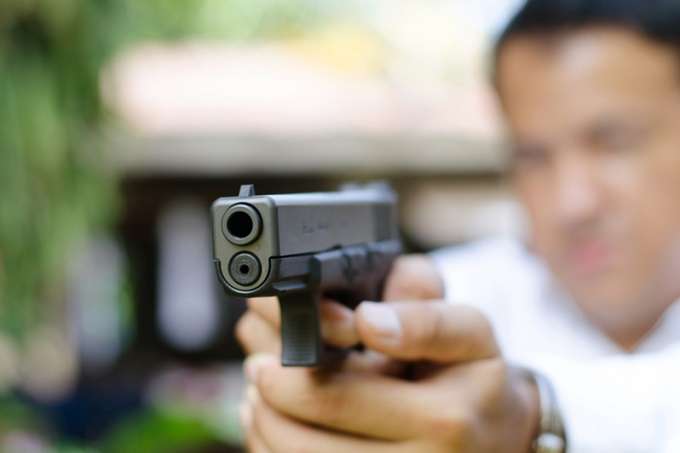
Absolutely. All forms of self-defense are effective. What matters most is learning how to apply it properly when the need arises.
What should you not do in self-defense?
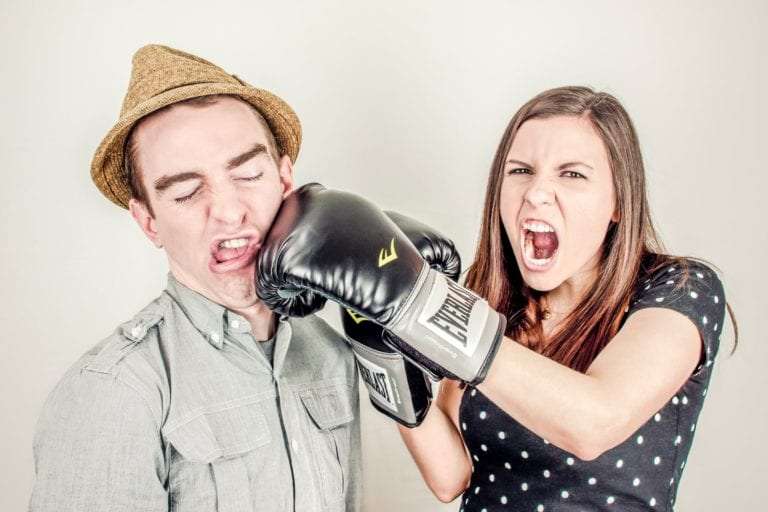
The first thing you shouldn’t do is panic. Panicking will only make things worse because then you won’t be able to think clearly. It doesn’t matter if you have a black belt, once you start to panic, it’s game over.
Secondly, avoid inflicting any fatal blows to your assailant, unless absolutely necessary. Focus on hitting your attacker to incapacitate them, but never to kill them. Taking the life of your attacker should be your last option. Once you’ve assessed that he or she is no longer a threat, call the police, and never retaliate.
Conclusion
Now you’re fully equipped with the knowledge you’d need to defend yourself or your family from criminal offenders. And we’re also sure you’ve already chosen your self-defense weapon and which form of martial arts you want to learn. Let’s just hope you won’t need to use them, ever.
Looking for a martial arts school where you can enroll the whole family? Or just want an introduction to self-defense? You can find all the best self-defense blogs in this article
